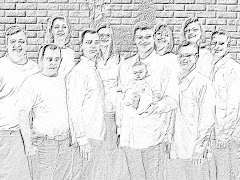The weather that day was horrible, the runner's equipment minimal, (OK, I agree a Speedo is even LESS) the cheering of spectators both sparse and sporatic, and the final objective of completing the race became secondary to their efforts of successfully coercing their body to not succumb to the pain.
The following article was written by Zackery Lewis, and appeared in Wednesday's Plain Dealer.
Looking back on the Rite Aid Cleveland Marathon on Sunday, it's tempting to view my narrow failure to qualify for the Boston Marathon as a series of tiny mistakes.
Rather than dodge all those puddles, for instance, I could have plowed right through them. I could have cut corners more tightly, found straighter paths through curves, and rallied a little sooner when the going got tough.
Surely, I'd like to think, the 77-second discrepancy between my finish and the Boston benchmark can be accounted for by minor missteps such as these.
Yet I know that's not true. The reality is, I simply didn't run fast enough.
Seventy-seven seconds doesn't sound like much, and it isn't, not in the context of my previous marathon times. But over the course of 26.2 miles, 77 seconds is actually quite significant, a veritable wall amounting to three whole seconds per mile, an amount not easily recouped when you're already pushing your limits.
By no means am I discouraged. Yes, I fell short of Boston, but I take huge joy in having lopped off nearly an hour from my time in last year's Cleveland Marathon and 22 minutes from my previous marathon best last fall in Columbus.
Now I know I have it in me.
Nor am I out of opportunities to keep trying. Between now and the Boston Marathon next April, I can think of at least three more road races in Ohio where hitting the mark is a distinct possibility. First in line is probably the Akron Marathon in September.
But I get ahead of myself, at least in writing. Before moving on to the next race, I should stop and process all the strange and wonderful things that happened at this marathon.
For example, in addition to achieving my personal best, I also wore a garbage bag for the first time. Until Sunday, I'd long avoided donning plastic, preferring to tough out precipitation in the raw. But the prolonged downpour at the start of the race drowned out any commentary from my fashion conscience.
Oddly enough, the weather proved to be an ally. As the temperature rose, the rain let up and the clouds gave way to sun, it felt as if all my troubles were literally evaporating.
The first half of the race passed blissfully without incident. All I did the first eight miles was focus on staying within sight of my speedier brother-in-law, Tim, who went on to finish strong a few minutes ahead of me. As long as I could see his back, I felt I was in good shape.
We were both in good company, as it happens. Tim's wife, Holly, and my wife, Nicole, who are twins, were both running the 10K, as was their father, Jay, and another friend. Three other friends were fighting their own battles in the marathon, while a fourth was on his way to his best half-marathon.
After Tim fell out of range, I switched to taking in the sights of the city. This year's course traded a tramp over the Lorain-Carnegie Bridge and past Progressive Field for a march down Detroit and Superior, through Public Square. The change was surprisingly refreshing, notwithstanding the bus that seemed oblivious to human traffic on the bridge.
The second, typically duller half was actually the more eventful. Although disappearing half-marathoners stole away some of the race's energy, hearing my church's gospel choir as I rounded East 30th Street onto Chester Avenue and encountering a cheery elite runner who'd already completed a race more than made up for the loss.
Then came the wildebeests. There I was, minding my own business, on pace somewhere around mile 15, when a large group of runners following a 3:10 pacer surrounded and then thundered past me, like a single-minded herd.
But my offense at being overtaken so brazenly transformed quickly into confusion: If I was on track for 3:10, how the heck was this group moving so much faster? One of us was working too hard or taking it too easy. More likely it was the latter.
Aside from the finish, which I'll never forget, the rest of the race is essentially a blur. All I remember is savoring the sunlight along Martin Luther King Jr. Drive, making an unexpected turn through Burke Lakefront Airport, taking note at how quickly we'd arrived back in the city, and getting a bizarre third wind somewhere near mile 24.
One thing, at least, stands out clearly in my mind: fan support.
Aside from a few crowded intersections, spectators at the Cleveland Marathon are relatively rare. But there were a few individuals who braved the weather and posted themselves along desolate stretches for no apparent reason other than to cheer us on.
Thankless, boring work it must have been, rewarded by little more than feeble waves and wearied smiles. But I think I speak for all runners when I say that support was simply invaluable, encouraging us to dig deep and making us feel like stars for a moment, whether or not we were destined to reach our goals.



No comments:
Post a Comment